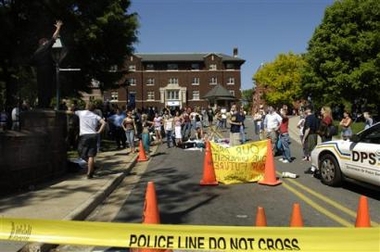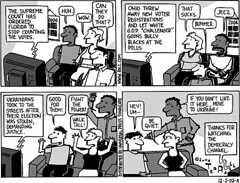Gallaudet: Continued
 Gallaudet University students rally to protest President-elect Jane Fernandes with speeches by student leaders and a sit-in which closed the main entrance to Gallaudet University in Washington, Tuesday, May 2, 2006. (AP Photo/Mannie Garcia)
Gallaudet University students rally to protest President-elect Jane Fernandes with speeches by student leaders and a sit-in which closed the main entrance to Gallaudet University in Washington, Tuesday, May 2, 2006. (AP Photo/Mannie Garcia)DC 1974 wrote in response to yesterday's entry about Gallaudet:
As someone who attended a private school in California, I'll have to say this is basically how it works. The board of trustees runs the school, period. And I know that we had policies that would have immediately expelled all protesting students. I don't know if I necessarily agree with it. But that's how it works. We repeatedly had presidents come in that students didn't like. The school accepted way more students than our buildings could handle. And the almost 100 year old name was changed. Sure people were upset. Sure people left. But it's the way it works at private schools, they simply are not beholden to anyone other than their money managers. State schools are different because they are public property. Private schools are not. So while I find the protests at AU and Gallaudet fascinating, I don't particularly think that the students have much of say.
My response (edited and slightly expanded from my reply):
Hey don't think it's much different at public schools, at least it wasn't at the University of Michigan.
Here though the students are making a different point, even though it is inchoate and difficult for them to express what they are arguing about.
If you read my first entry about Gallaudet from May ("What People Protest..." ), I said exactly what you said, and that their reservations didn't seem to be all that significant -- "She doesn't say hi! Better President Now!"
And I think this is a problem of what I call politics of self-affirmation, rather than a more outward and external focus.
-----
In cultural heritage, history, and historic preservation, I am somewhat derisive and politically incorrect when I refer to "history as self-affirmation" as opposed to being more factual and outwardly focused--it's difficult to balance a wider context with personal experiences. Both must be included. Broader understanding and the inclusion of multiple perspectives demands it. But the personal history is not superior to the wider context, and should be interpreted within the broader framework.
-----
But in this case, Gallaudet University is an outlier. It is truly an instance where who is president has ramifications that extend far beyond the campus.
It's the Harvard of the deaf world, and has the same level of significance within that broader community, just as Harvard is considered to be first among equals within the higher education field, and the Harvard University President is an ambassador of sorts to constituencies outside of the normally campus-bounded and/or campus-connected communities that concern a typical university's administration.
Think Derek Bok of Harvard, James Conant of Harvard back in the day, even Charles Vest, past president of MIT and the role of the president of MIT as a national leader of science and engineering policy.
And hey, look what happened to Larry Summers at Harvard.
The Harvard Board didn't care about his problems (interestingly the Wall Street Journal had a column on Tuesday about jerks at work, and how high they can rise, which is completely applicable to Larry Summers) and bluntness. And maybe they weren't attuned enough to the broader roles served by the president as a representative to broader publics and constituencies than maybe the Board considers.
The faculty did consider those broader concerns. And they brought Summers down.
I'm not sure the average head-hunting firm, even one retained by Harvard, would have an adequate understanding of these broader roles, something I've been writing about quite a bit with regard to public agencies (i.e., Richard White vs. Dan Tangherlini at WMATA as one example, but I have others). (If I get it together, I think this is an area where I can make a pretty good consulting practice...)
For some other discussion about this broader point, see:
--Main Street and getting schooled in politics, constituency building, and building support for your program
-- More on Metro and rethinking transit marketing.
Oh, and don't forget to read the Post editorial about how the Gallaudet students should pack it in, "Giving Gallaudet a Bad Name," subtitled "Student and faculty protesters have harmed their institution and the many students who want to learn."
It's the typical kind of newspaper editorial to be expected in the face of student opposition to traditional institutions. It would be interesting to go back and look at the Post editorials (I just did a quick search at couldn't find any editorials in the 1988 coverage, but other keywords might yield different results) about the first Deaf President Now! campaign back in 1988, as well as other editorials about protest and challenge to traditional authority.
(Also see Todd Gitlin's book, The Whole World is Watching about SDS, the Vietnam War, and how traditional news organizations covered the anti-war movement.)
 And yes, if you click on this image, it will take you to a much larger, readable version.
And yes, if you click on this image, it will take you to a much larger, readable version.Index Keywords: civic-engagement



0 Comments:
Post a Comment
<< Home